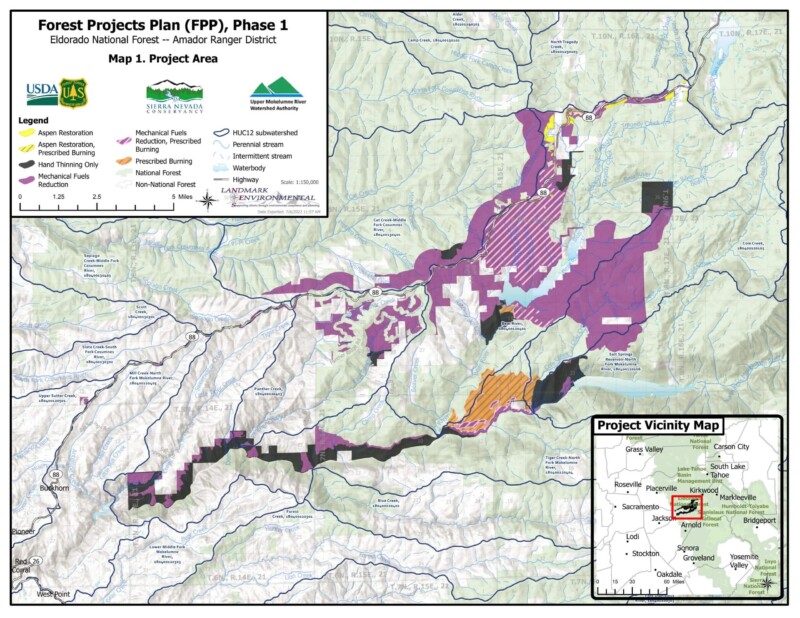Forest Service Contact:
Stephanie Bishop, (303) 961-5540
UMRWA Contact:
Richard Sykes, (510) 390-4035
PIONEER, Calif., June 28, 2023— As part of a stewardship agreement between the USDA Forest Service and the Upper Mokelumne River Watershed Authority (UMRWA), hazardous fuel reduction is expected to begin this summer on a 25,671 acre project within the Amador Ranger District of the Eldorado National Forest. This project, called “Forest Projects Plan Phase 1”, is designed to help prevent high-intensity wildfires, improve forest conditions, protect important wildlife habitat and other forest resources, and protect a water supply that serves approximately 1.5 million people. Funding to start the work is being provided by two grants that UMRWA received from CAL Fire — a $5 million Wildfire Resilience grant and a $7 million Forest Health grant.
“Catastrophic wildfire in this watershed can severely degrade the water supply for communities in Amador, Calaveras, San Joaquin, Alameda and Contra Costa counties,” said John Coleman, Chair of UMRWA’s Board of Directors. “This project is the next step in a longstanding collaboration with the Forest Service and many other stakeholders who want to protect this watershed.”
Richard Farrington, UMWRA and Amador Water Agency Board Member added, “Implementation of the Phase 1 work will reduce the risk of a mega fire in wildland urban interface areas which is critical for community protection.”
Collaboration to develop the project included the Amador-Calaveras Consensus Group, a community-based group of diverse stakeholders that works to create fire-safe communities, healthy forests and watersheds, and sustainable local economies. The Sierra Nevada Conservancy provided funding for project planning.
The treatments that will be done on the landscape are designed to slow wildfire spread by reducing ladder fuels. They will also improve firefighter safety and effectiveness at controlling wildfire. Non-commercial vegetation treatments and prescribed burning activities will enhance and protect a variety of habitats including mature forest ecosystems, aquatic ecosystems, and aspen stands. The treatments will enhance forest health by reducing competition for resources in dense forested stands and other habitats that have been diminished due to conifer encroachment from lack of fire.
“UMRWA’s ability to secure grant funding and manage contracting as part of our stewardship agreement expands our capacity to get work done on a larger scale,” said Linda Helm, Amador District Ranger on the Eldorado National Forest.
Future plans for Phase 2 of this project will be larger in scope and will include lands in both the Amador Ranger District of the Eldorado National Forest and the Calaveras Ranger District of the Stanislaus National Forest.
A summary of treatments to be completed in Forest Projects Plan Phase 1 is as follows:
Treatment Activity and Approximate Acreage:
Mechanical Fuels Reduction: 14,537 acres
Mechanical Fuels Reduction Plus Prescribed Burning: 4,715 acres
Prescribed Burning: 1,888 acres
Aspen Restoration: 172 acres
Aspen Restoration Plus Prescribed Burning: 22 acres
Hand Thinning Only: 4,337 acres
Total Acreage: 25,671 acres


